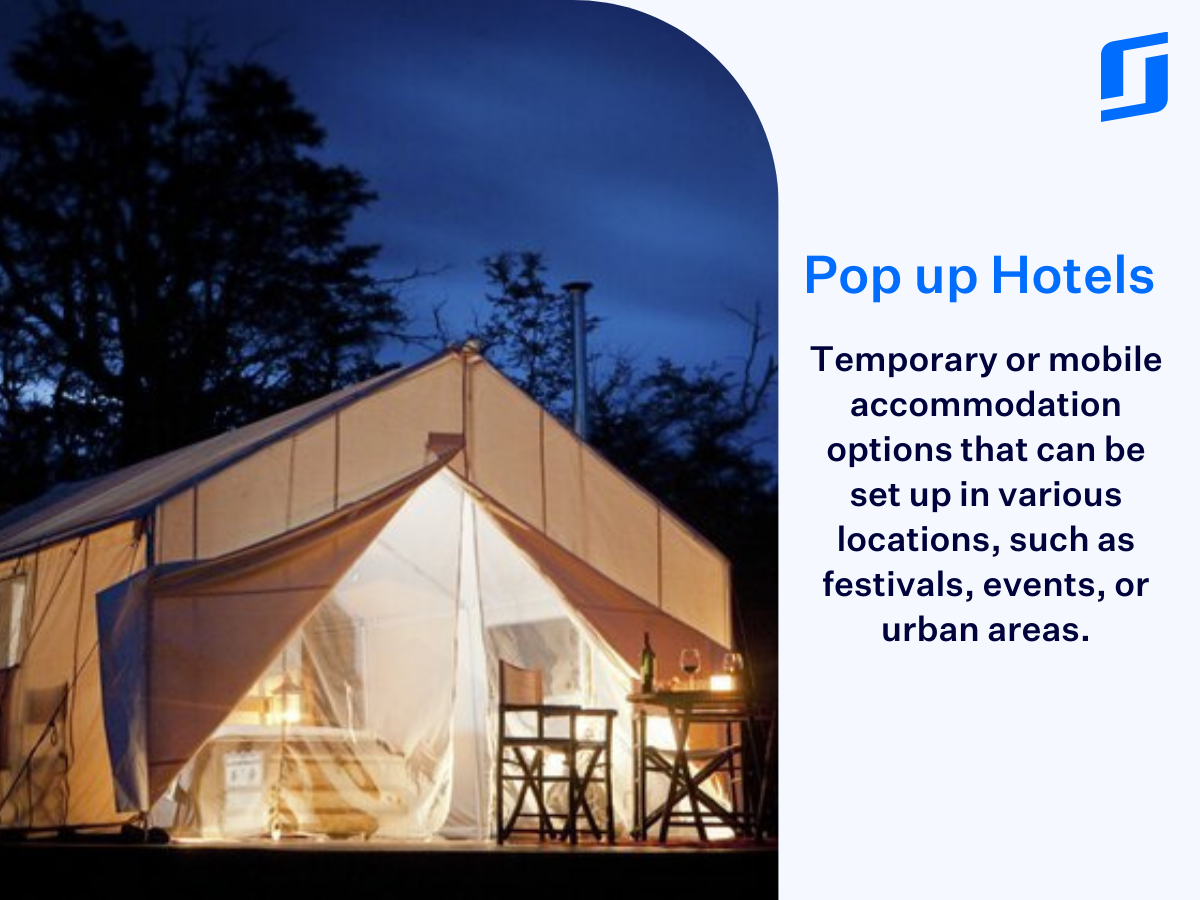What is a pop up hotel?
A pop up hotel is a temporary hotel that quite literally ‘pops up’ – appearing temporarily – sometimes for a season, sometimes for a single event, before being taken down or moved on to the next location.
What is the meaning of ‘pop up hotel’? The name refers to the short-term structures that make up this type of accommodation. Pop-up hotels can be created from modular kits, expanded like tents and awnings, rolled in on wheels or built from nature.
The concept of a pop-up service is neither new or foreign to most people. More and more pop-up restaurants, salons, or art installations and the like are dominating city environments, mostly to positive responses from the public.
Pop-up hotels on the other hand; surely that’s a bit much? How can the experience of a quality hotel stay be replicated on a temporary basis without being disproportionately expensive? And if it happens to be affordable, how could the experience be an enjoyable one?
Despite these concerns, pop-up hotels are indeed on the rise, and seem to be popular. So what’s behind the evolution of pop-up hotels? A number of factors need to be considered to answer this question. Here’s what we know so far…
Table of contents
Why are pop up hotels becoming popular?
Pop-up hotels are gaining popularity for a few reasons. The fact that they don’t last forever makes them an inherently exclusive type of accommodation. They have the wow factor, offering a unique and often instagrammable experience. And they can also be excellent revenue generators that allow property owners and event organisers to host more people, with the often basic accommodation being part of the charm.
Maximise the revenue of your hotel with SiteMinder Tell the world about your property, attract more bookings and drive more revenue with SiteMinder, the world’s largest open hotel platform.
What is an example of a pop up hotel?
In terms of a pop up hotel at an event, the appropriately named Pop-Up Hotel Glastonbury has been a mainstay of the UK’s biggest music festival since 2011. It offers 26 different pop up hotel room types that cost up to an eye-watering £28,000 for the five-day event.
Another popular type of pop up hotel are the seasonal ice hotels that dot the northern hemisphere over winter, such as the (again appropriately named) ICEHOTEL in Sweden. These igloo-inspired constructions can be surprisingly warm inside, while the pop up hotel prices are far more reasonable than what you’ll find at Glastonbury.

Trends in pop up hotels and why they may be here to stay
The trend of pop up hotels is riding a wave of social media, thanks to the unique experiences that this type of accommodation can deliver. By setting up a pop up hotel in an otherwise undeveloped area, you also grant travellers incredible views, which translate to incredible Instagram posts.
But to put the trend of pop up hotels purely down to social media would be to suggest that they are nothing more than a trend. But that would ignore the unique proposition that this type of accommodation brings to the market. Here’s why pop up hotels might be here to stay.
1. Pop up hotels are driven by millennials
Currently the largest generation in the United States are millennials, and they’re just the group who are likely to embrace a trend like pop-up hotels.
In fact, a recent study in America found that 72% of millennials would prefer to spend money on experiences than on material objects. This same demographic is also 23% more interested in travelling than older generations.
A further study by American Express revealed that nearly 70% of millennials are looking for “a personalised travel experience” throughout their vacations.
The most beautiful marriage between millennials and pop-up hotels comes in the form of festivals and events. Millennials will often travel for these experiences and if a unique accommodation like a pop-up hotel is offered by the venue, they’re more than likely to try it.
2. Pop up hotels promote adventure
Pop-ups offer adventurous travellers an extremely sharable experience, something that plays well on social media and satisfies a desire to do something different while on holiday.
Music festivals in particular are providing an environment where pop-up hotels can thrive, so much so that Marriott has a partnership with Coachella, a famous festival in Colorado. Marriott is experimenting with bringing glamping to the 10-day event, in the form of tents, offering hotel comfort with plush beds, air conditioning, and electricity.
This is a win for both the Marriott brand and guests. Marriott is able to custom design and personalise their structures by replicating rooms from their portfolio, and they also increase the chance of winning guest loyalty.
For guests, it’s an opportunity to experience the Marriott brand in a unique way and see if they want to stay with them again, and it’s also a way to enjoy their festival trip in much more comfort than they ordinarily would have.
3. Pop up hotels have unique locations
Businesses like The Pop-Up Hotel and Flash Camp are seeing plenty of success, along with startups such as Collective Retreats, and the concept is a strong opportunity for all entrepreneurs to seek their living.
In the past 20 years, design and boutique hotels have invigorated the industry, and many experts expect experiential hotels to do the same.
Think of the extra tourism boost remote locations like Kakadu in Australia’s Northern Territory could enjoy with this redefined vision of hospitality.
Switzerland is a country that’s fully embracing the trend. Off the back of research that found 25% of overnight visitors were looking for ‘hidden’ places, the country’s tourism body launched pop-up hotels for the summer in 11 unique locations. The idea is that guests will find new and unusual hotel experiences, as well as seeing untouched, or unknown tourist paths.
There’s a growing feeling that hotel luxury can come in many different forms, and if Marriott is experimenting with pop-up hotels, other brands may be encouraged to do the same.
Should you consider a pop up hotel for your brand?
If your property is intrigued by the possibilities of pop-ups, why not start small? Design and create your branded concept and trial pop-up experiences within sections of your existing hotel.
You can then collect feedback from guests and gauge their experience, before you decide whether the pop up hotel phenomenon is worth pursuing in earnest.
Is it a different kind of hotel experience that some guests will always be attracted to or is it simply a novelty? The one certainty now is that pop-up hotel experiences are different to what travellers are used to, and your key guest segments could be willing to try anything that gives them a sense of excitement and a fresh perspective.

